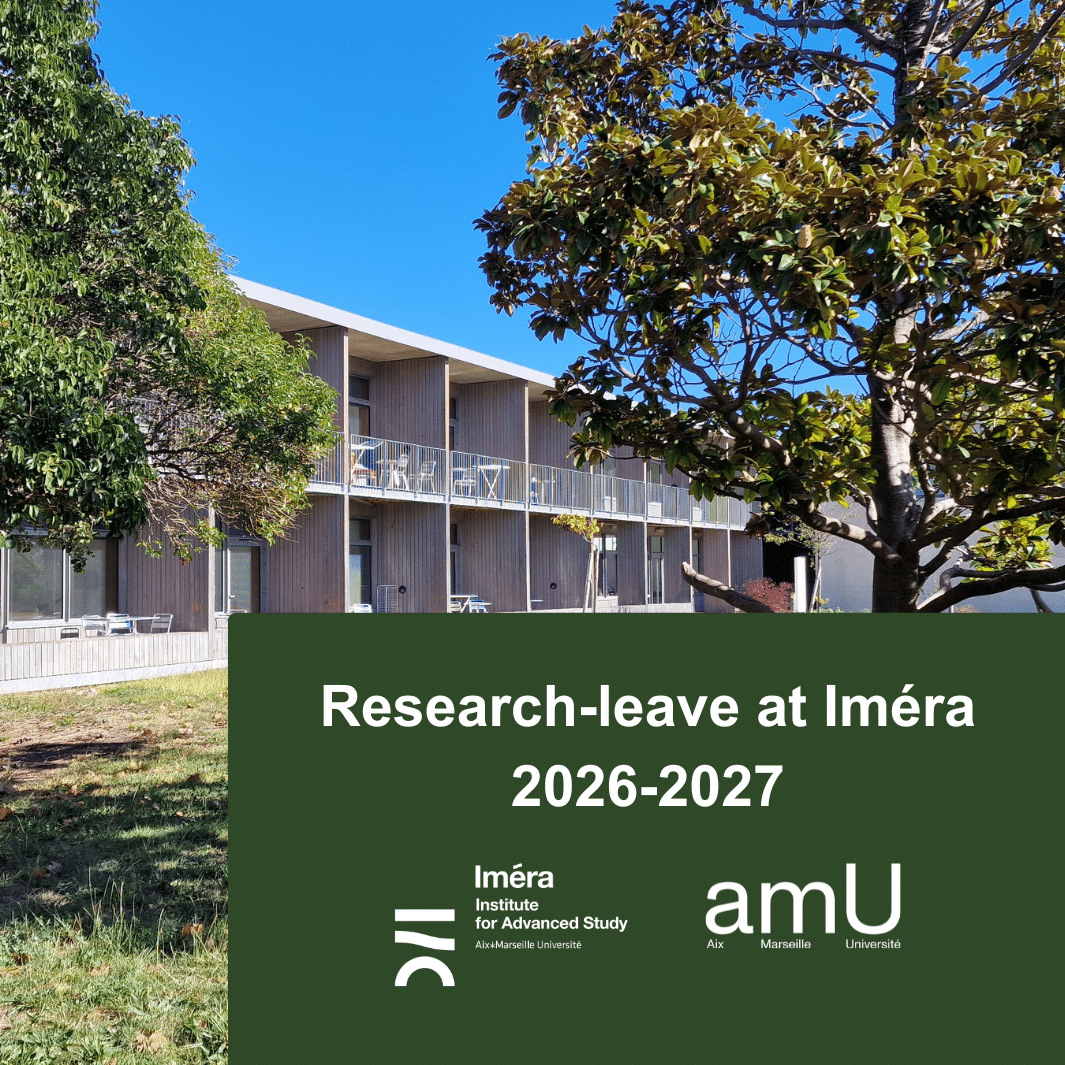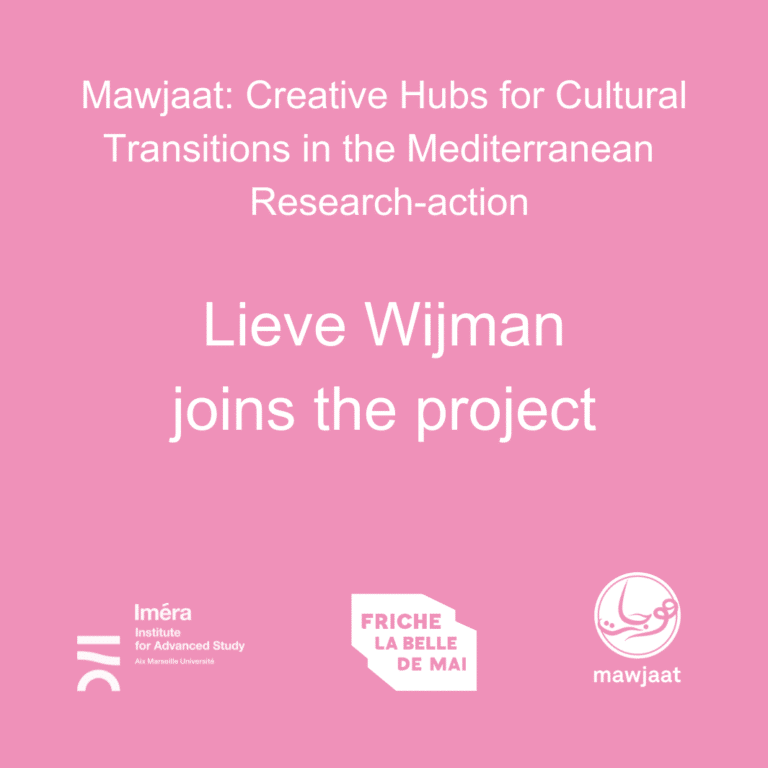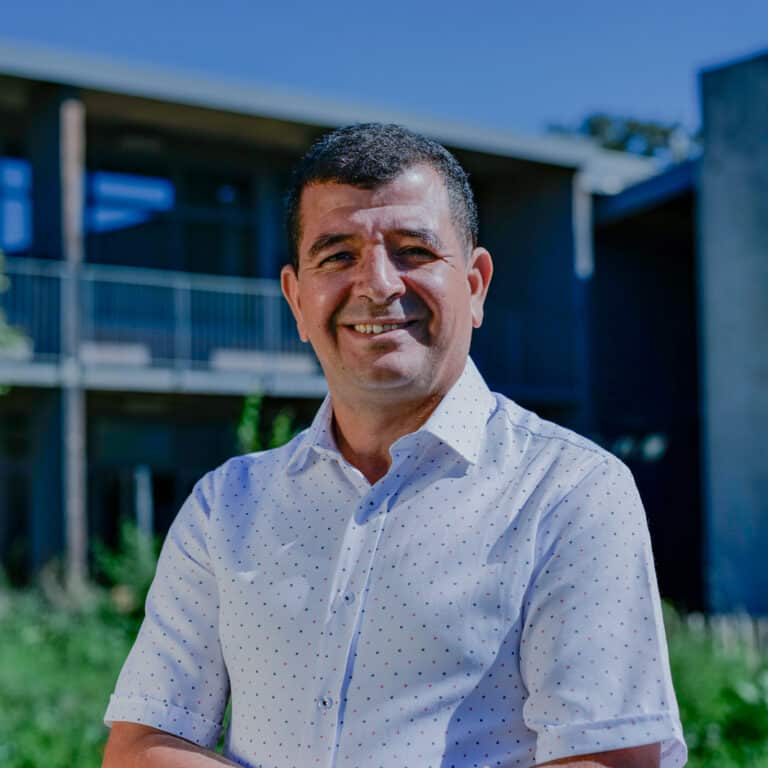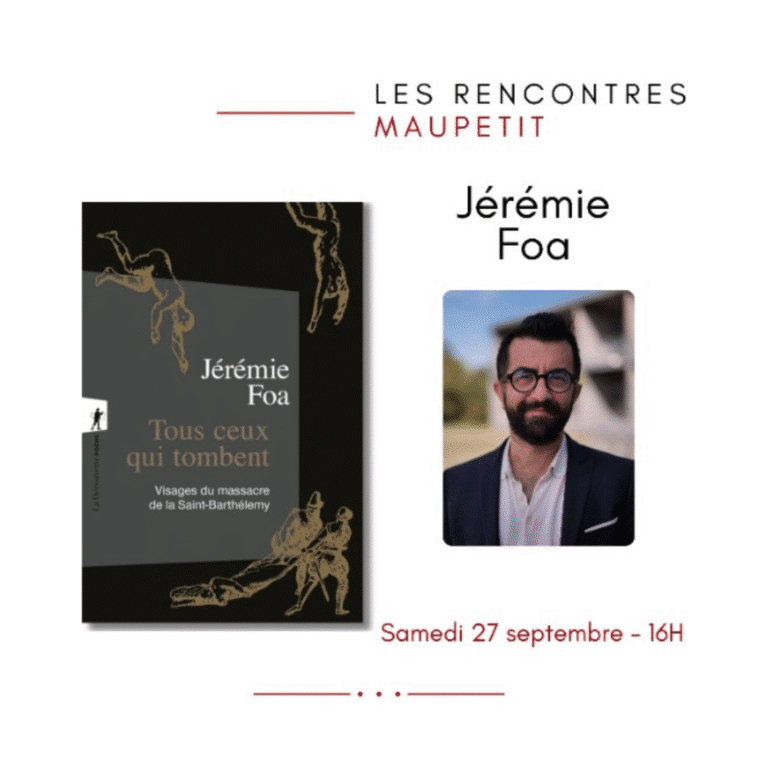Apply for research-leave at Iméra as part of the 2026-27 national CRCT (Research or Thematic Conversion Leave) annual application campaign.
A home in an international and interdisciplinary context: a residence specially designed for teacher-researchers at Aix Marseille Université.
This call for applications is now closed.

Iméra, Aix Marseille Université’s Institute for Advanced Study (IAS), is a sanctuary of intellectual freedom where a temporary community of top-level international scientists and artists can find the time, space and resources they need to discover new meaning and content for their research. Since the 2021-22 academic year, this kind of setting has been open to lecturers and researchers at Aix Marseille Université, who can spend six months rethinking their relationship with their discipline and other fields of knowledge, and possibly undertake a thematic reconversion through contact with residents from a wide variety of geographical and disciplinary backgrounds.
As part of the annual national CRCT campaign, this research-leave gives the right to a full release from teaching for its entire duration (in the first or second semester). Four residents on research-leave will be welcomed during the 2026-27 year. They will be provided with an office in one of Iméra’s co-working spaces, shared with the other residents. Finally, they will have a budget of 2,500 euros to help them carry out the projects selected in the call (missions, organisation of events, etc.).
From this campaign onwards, applicants wishing to submit an application to Iméra’s annual “amU Fellow” call must do so at the time of the national phase. Applications will not be accepted during the local phase in January-February.
Research projects must be part of one of Iméra’s four scientific programmes: “Arts & sciences: undisciplined knowledge”, “Interdisciplinary explorations”, “Mediterranean” and “Necessary utopias”, in which they will play an active part, taking part, for example, in workshops and seminars, with the possibility of proposing the organisation of events and original exchange formats. At the same time, participation in the Community Building Seminar provides an opportunity for weekly exchanges with all the residents and members of Iméra’s scientific team in order to compare questions and methods, and even to experiment with research and/or creative formats developed as a group. The two languages spoken are French and English. In a spirit of conviviality, the seminar is always followed by a lunch with all the residents and staff of the institute.
The Interdisciplinary Explorations programme :
It covers all issues related to the theory and practice of interdisciplinarity in university research and teaching. The projects of Iméra residents collaborating on this programme may concern any discipline and must have an interdisciplinary dimension.
Priority will be given to cross-disciplinary projects, i.e. interactions between disciplines belonging to at least two of the following areas of research:
- Exact sciences (mathematics, logic and computing)
- Natural sciences (physics, biology, chemistry, etc.),
- Humanities and social sciences (psychology, sociology, anthropology, history, etc.),
- Health sciences (medicine, neurosciences, psychiatry, etc.)
- Humanities (literature, arts, philosophy, etc.).
For further information on this programme, please contact Enrico Donaggio, Scientific Director of Iméra (due to the vacancy of the post of director of the programme): enrico.donaggio@univ-amu.fr
The Mediterranean programme:
It focuses on all issues related to the deployment of the notion of the Mediterranean from antiquity to the present day, in university research and teaching. The projects of Iméra residents collaborating on this programme may involve any discipline.
Preference will be given to projects that can be integrated into the following research areas:
- Tales of migration and mobility across and around the Mediterranean, from Antiquity to the present day.
- The complexity of colonial and post-independence legacies at the root of contemporary identity reconfigurations around a shared sea.
- The issue of religion in the Mediterranean, particularly Mediterranean Islam.
- The Mediterranean in the age of the Anthropocene and the issues surrounding global warming, water management and the heritage of Mediterranean areas.
- The archives of lifestyles in Mediterranean societies and cities, including in digital form and in forms processed by artificial intelligence.
- The invention of the Mediterranean: the problematisation of the field of Mediterranean studies.
For more information about this programme, please contact Brian Sandberg, Mediterranean Programme Director: brian.sandberg@univ-amu.fr
The Necessary Utopias programme :
It is open to scientists from all disciplines, artists and social players, thinkers and/or creators in the broadest sense of the term. Applicants must be driven by a passion for intellectual risk-taking in their field of research and/or action. Their project should propose new ideas and new practical perspectives for tackling the challenges, whether local or global, that the contemporary world considers decisive but impossible to win without actually thinking and acting differently. The fields of invention and application of these necessary utopias include the ecological crisis, health, migration, work, economic and social inequalities, housing, education and the crisis of political participation.
For further information about this programme, please contact Enrico Donaggio, Scientific Director of Iméra and the Utopias needed programme: enrico.donaggio@univ-amu.fr
The Arts & Sciences : indisciplined knowledge programme:
It is cross-disciplinary in the sense that each of the research projects it hosts is also linked to one of Iméra’s three other interdisciplinary programmes: Mediterranean, Necessary Utopias and Interdisciplinary Explorations. It is therefore important to also select one of these programmes in the application form and to propose a relevant project at the intersection of the “Arts and Sciences: Indisciplined Knowledge” programme and the selected thematic programme (see descriptions above). This programme represents a space for collective reflection on research in art and on art, recognising that art has specific characteristics, including the freedom not to be a discipline in itself, by combining, for example, knowledge of different natures and periods. This programme is therefore run collectively by all the members of the Iméra’s scientific team, with their varied disciplinary backgrounds. The term ‘art’ encompasses all existing modes of artistic expression. From a thematic point of view, the attachment to another programme and to one of its scientific axes allows research and questions raised by art (research on art) or constitutive of art (research in art) to be nourished and questioned by a regular dialogue with the other residents and associated researchers working on a common thematic field, and vice versa.
Researchers working on and with art may come from any of the humanities and social sciences, including art theory, art history, sociology, anthropology, philosophy, geography, and so on. It is also open to the exact and life sciences, provided that the research project has a close link with art and/or artists. In all cases, the research concerned here must be able to problematise the impact of art in society or its commitment to society and/or its position as a crossroads between several types of knowledge, in relation to one or more of the issues addressed by the thematic programmes (see the suggestions below and their general descriptions).
As far as artists are concerned, Iméra can accommodate several phases of their project insofar as these require a sustained dialogue with researchers from academic disciplines during the conception of a work, a thought, a piece of writing (whether theoretical, poetic or of another nature) very early in the process or a little later in the development phase of a work, but prior to production.
For more information about this programme, please contact Constance Moréteau, scientific coordinator and head of development of the Arts and Sciences axis: constance.moreteau@univ-amu.fr
After receiving the opinion of the applicant’s component, eligible projects are evaluated by two experts from the academic world, external to Aix Marseille Université, identified for their level of scientific qualification and their relevance to the project, according to the evaluation criteria below.
The candidate’s background, marked out of 5 (coefficient 1)
- The candidate’s scientific expertise on the subject presented;
- International experience.
The relevance of the project’s registration with Iméra, marked out of 5 (coefficient 1)
- Inclusion in one of the Institute’s scientific programmes, and consideration of one or more of its areas of research;
- Degree of openness to the collegial dimension of the institute (potential dialogue with its scientific team and other residents).
Quality and ambition of the project, graded out of 5 (coefficient 1)
- Relevance of the scientific approach and rigour ;
- Originality of the method and/or subject ;
- Risk-taking and experimentation.
Interdisciplinary approach, marked out of 5 (coefficient 1)
- Proven practice of interdisciplinarity by the candidate;
- Its practicality within this project.
Total: marked out of 20
- This call is open only to associate-professors and full-professors at Aix Marseille Université, regardless of their discipline.
- Among them, only those who have not obtained a CRCT in the last three years in accordance with the rules of the national campaign are eligible.
- Among them, only those who can demonstrate at least a passive knowledge of English, which is one of the two languages used in exchanges with other residents, and in particular during the Community Building Seminar, are eligible.
The delegation lasts 6 months and takes place :
- Either in the first half of the year, between the beginning of September 2026 and the end of February 2027.
- Or, in the second half of the year, between the beginning of February 2027 and the end of July 2027.
As this scheme is part of the national CRCT campaign launched by the Aix Marseille Université HR Department, you should respond directly to this campaign, enclosing the following documents:
- The individual application form, which should include details of the scientific project,
- A curriculum vitae
- The Iméra application form
Candidates who have submitted an “am Fellow” application during the national CRCT campaign under the CNU quota do not need to re-submit an application for the local campaign. Applications not accepted by Iméra are automatically transferred to the quota of applications to be studied locally. Please note that it is not possible to submit an application in response to Iméra’s “amU Fellow” call at the time of the local campaign.
The project must therefore be submitted to NAOS by the deadline (before 17 October 2025 at 16:00) and the whole application (CV + individual form + Iméra form including the scientific project) to your component (also before 17 October 2025).
| 22/09/2025 (10h00) | NAOS opening (deposit required for Iméra “amU Fellow” candidates). |
| 17/10/2025 (16h00) | NAOS closing |
| 17/10/2025 | Submission of applications to the various departments (transmission procedures set by the departments) |
| 30/10/2025 | Notification date from university’s departments to the HRD |
| 06/11/2025 | CAcR: opinion before being sent to the CNU. Applications from amU Fellows who have received a favourable opinion are sent to Iméra for evaluation. |
| from 06/01 to 10/02/26 | NAOS is open for applications from the institution only (except applications for the Iméra “amU Fellow” call, which can only be submitted during the national phase). The applicant submits his/her application in NAOS and to his/her department according to the procedures of each department |
| 12/02/2026 | The list of applications is forwarded to the components by the HR Department |
| 27/03/2026 | Publication of CNU CRCT attributions |
| 27/04/2026 | Publication of notices from the departments to the HRD and return of Iméra notices to the HRD |
| May 2026 | Assessment by CAcR members of CRCT applications for the local phase |
| 04/06/2026 | CAcR: local CRCT allocations |
| July 2026 | Notification of CRCT decisions |
Information
- For full information on the CRCT campaign, please consult the following dedicated page: https://www.univ-amu.fr/fr/intramu/actualites/crct-2026-2027
- For general information about Iméra’s research leave scheme and the cross-disciplinary programme Arts and Sciences: Indisciplined Knowledge, please contact Constance Moréteau, Iméra’s scientific coordinator and head of development for the Arts and Sciences axis: constance.moreteau@univ-amu.fr
- For information on any of Iméra’s thematic scientific programmes, please contact the programme manager (see box above).
- For general information on the amU CRCT campaign, please contact Guylaine Racouchot, Head of Collective Campaigns Management
DRH :



